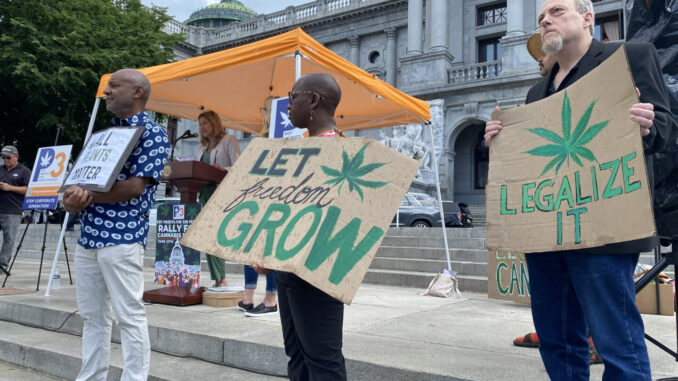
Hannah Peters | Staff Writer
Let’s be blunt, Pennsylvania is behind the times when it comes to marijuana.
With Ohio legalizing recreational marijuana use just last Tuesday, Pennsylvania and West Virginia remain the only states in the Mid-Atlantic region that have yet to make recreational marijuana legal.
Pennsylvania considers marijuana a Schedule 1 drug, meaning it is classified as having “No currently accepted medical use and a high potential for abuse,” according to the Drug Enforcement Administration. However, this idea does not hold up to research or even Pennsylvania’s own legislation.
In 2016 Pennsylvania passed legislation that legalized marijuana’s medicinal use as long as you qualify for one of the 24 recognized medical conditions. As of July, there were over 942,000 registered patients in Pennsylvania’s Medical Marijuana Program, according to the Pennsylvania Department of Health.
Despite making strides in the medical field, Pennsylvania has yet to decriminalize marijuana, allowing for long lasting impacts on thousands of Pennsylvanians.
In an interview with the Tribune-Review, Patrick Nightingale, attorney and executive director for the Pittsburgh chapter of the National Organization for the Reform of Marijuana Laws, explained how harmful a marijuana charge can be.
“The opposition pretends that being arrested, being prosecuted, placed on probation and having a criminal record is not important,” Nightingale said. “It’s not the most serious crime on the books, but if you get convicted you can lose professional licenses, you can lose employment, you can lose federally subsidized student loans, you can lose access to federally subsidized housing.”
Abiding by the law is important, but the uprooting of life that can happen as a result of criminal charges related to marijuana does not match the severity of the crime.
Clearly the system is failing its people if a plant that can be prescribed as medicine has the power to upheave someone’s life in the name of justice.
According to Pennsylvania state law, possessing any amount of marijuana less than 30 grams is considered a misdemeanor punishable by incarceration and/or a fine. Possession of paraphernalia is also considered a misdemeanor and cultivating marijuana is a felony.
Over 13,000 arrests were made in Pennsylvania for marijuana possession in 2021, according to the Pennsylvania State Police. While this is a significant reduction from the year earlier, which reported over 20,000 arrests, these numbers highlight the need for decriminalization.
This idea has already been recognized by 15 local ordinances in Pennsylvania, including Pittsburgh and Philadelphia, which have successfully passed decriminalization laws. It is still a crime, but the punishment doesn’t go beyond a fine.
While these have been a step in the right direction, Pennsylvania has yet to take widespread action.
Typically, the reasoning behind criminalizing marijuana has to do with its status as a psychoactive drug and the potential threat it poses to public health.
Except this isn’t the issue. The question really lies in whether or not the effects of the substance is enough to treat those who use it as criminals.
It can’t be just that it’s a mind-and-mood altering drug with potential dangers. Alcohol has been a legal and socially accepted drug, besides a brief prohibition, since the founding of this nation. And while Pennsylvania’s alcohol laws are stricter compared to other states, there are still plenty of opportunities for residents to purchase and consume booze.
In fact, alcohol arguably poses a much greater risk for harm and yet it is much more socially acceptable.
So why can’t we treat marijuana the same?
Unlike other drugs, not a single death due to marijuana overdose has been reported according to the National Institute of Health.
Let me ask you this: would you rather have a parent who is an alcoholic or hooked on weed? Skunk smell and extra snacks or likely abuse?
Neither of these scenarios are ideal or healthy, but only one of these scenarios includes a legal substance- and it’s not the mood-elevating one.
One might say legalization will only bring in a flood of new users, but refusing to legalize it for fear of widespread use is ridiculous and unrealistic.
This is not a new drug – legalizing it will not change people’s mind on whether they want to start recklessly using a well-known substance. Let’s be real, the law is not actually stopping people from using marijuana.
In fact, legalizing cannabis would allow for safer use. There would be opportunities for better education on the topic, something that could combat increased and reckless use.
Instead of people turning to a drug dealer and risk the weed being laced, faulty or contaminated by the seller, they would have a qualified expert ready to educate and sell certifiably-safe marijuana from a known source.
Not to mention the economic benefits that would be achieved by moving marijuana from an illicit market to a regulated one.
Ultimately, not only would legalization acknowledge marijuana for the medically beneficial substance that it is, but it would bring in additional advantages as well.

